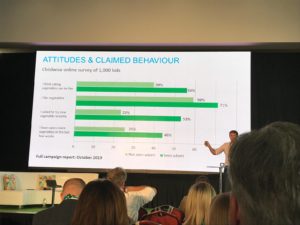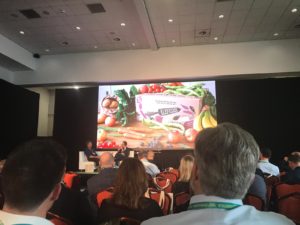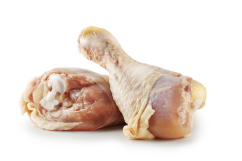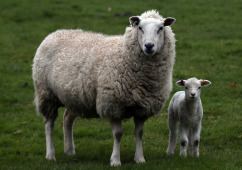NFU
A number of key industry speakers took to the stage on Tuesday 8th October at the Ricoh Arena for the FPJ live 2019 conference. So what were the main takeaways?
The B-word, Brexit of course was a major point for discussion. We were also privy to talks on Fresh Produce Brands; the methods and means of producing more fresh produce; sustainability; robotic innovation; health and fresh produce benefits; food waste and climate change.
Have a read below of our own round-ups of the talks that we attended.
Kantar
Joe Shaw Roberts, Insights Director for Kantar discussed sustainability in the produce sector and the ways in which meat consumption is reducing. 81% of those questioned as to why they moved towards a meat-free/reduced diet, cited health reasons as the main motive.
Joe went on to say that some produce sectors are growing whilst others are not. Products which are going in to plant based meat free meals are rising whilst many other fresh produce items such as broccoli and potatoes are not growing as fast as they usually accompany meat as part of an entire meal.
Trends are showing that sales of whole head produce are growing faster than pre-prepared produce with a rise in cooking from scratch due. This could be attributed to consumers wanting to reduce their packaging waste or simply because it is cheaper. Consumers are becoming more careful about what they buy and want more lbs for their pounds. That being said, further findings suggest that 44% of shoppers are now more concerned about selections on packaging too.
Jack Ward (British Growers Association) and Hayley Campbell Gibbons (ADHB).
In a really interesting talk and one which had everyone fully tuned into. The overarching feeling is that Brexit-systems are not in place and the government is not ready for the 31st of October when it is planned that the UK will leave the EU.
There simply are no answers at the moment as to what will happen. However, there is optimism that a deal will be in place and that no matter what, the flow of goods will continue. Clarity from the government is fundamental in trying to get this.
Any perceived threats and opportunities from outside of EU won’t happen day on day one of departure: the 1st November should be the same as 31st October, if not with some port border challenges.
Going forward, DEFRA budgets will also have a focus on supporting on Automation and crop protection.
The British Growers association remain ambitious despite the uncertainty. They have continued to grow and will continue to support the industry and growers.
Avnish Malde (Wealmoor)
Traditionally, Wealmoor had always been a very private, family-run business. Now though they are more in the public eye and are keen to project their values and ethos to the outside world.
They believe that the global supply chain is important as they have many relationships worldwide. There is much going on and they are trying to further integrate and invest in their farming operations in five countries.
Wealmoor is creating more brands, such as Herbfresh and Saxons Asparagus with the view to create a sense of provenance and owning stories about production. In time they think that they can get more brands out there on the global market, but they want to do so, cleverly, whereby the story is central to each.
They went on to say how sustainability is of paramount importance and they are investing in communities and growers. In the likes of Kenya, they plan to attack the issues of climate change head-on for a more promising future.
John Gray (Angus Soft Fruits)
The berry category is booming! There is huge reported growth which is down to three factors within their business:
- People
- Their strong supply chain
- Being adaptable
There are still opportunities for growth- the market has grown by just under 50% in 5 years. The 4 key berries are still growing but more steadily. John sees premium as a growth area.
Geographically, Peru is predicted to overtake Chile in terms of the volume of berries produced this year.
Most interestingly, the producers of British summer fruits, still are competitors but have opted to work together to drive growth.
In terms of the marketing of products, the trend is to continue with direct contact with consumer through campaigns.
How does geopolitics affect this sector? Gray suggested that it will be an impact no matter where anyone is in the UK, but suggests to look at it as an opportunity.
Mark Culley (Orchard Fruit Company).
They have seen success after the restructure and renaming to the Orchard Fruit Company. Their focus on an overall capacity allowed them to take cost out and remain competitive. The result: new customers, which are growing in their market space.
Under the previous name, Orchard World which is a company that has existed for 30 years and in that time frame, they have seen many changes.
The “pile it high, sell it cheap” mantra of Tesco is now a memory and in that bygone time, you used to have lots of customers, but now all seemed to have merged. Growers have grown bigger which has allowed retailers to go directly to them . The result: retail grower partnerships and investments.
Therefore it is not necessary for a ‘middle-man’ to connect retailers and growers – this relationship can be direct, hence lowering costs. There are now opportunities in the export market which are ripe for exploration and exports into Asia currently are growing considerably. Can you get better returns from export? Culley suggested that some of their best return is in the export market.
Longer-term visions for Orchard Fruit Company include continue to do what they are doing, whilst being innovative. And in terms of predictions, cherries will continue to grow significantly.

Tom Watson– (MP and Deputy Labour Leader)
Tom Watson was very apologetic for the current Brexit situation and how parliament is dealing with it. He suggested that crashing out of the EU would be a huge political failure and the House of Commons with its complexities makes it very difficult to siphon out plausible solutions. Watson acknowledged how serious the situation is. He went on to say that consumers are not aware of how delicate the situation is for food and in particular produce. His view is that everyone needs to give a little to have continuity.
He went on to say that he doesn’t think the UK will crash out on 31st of October, but he doesn’t know what the next steps are going to be.
Overall the deputy leader of the Labour Party, much like everyone else doesn’t know what’s going on!
Side note, he’s been on a health drive himself which has seen him lose 8 stone over the past few years! He puts it down to changing his eating habits to more fruit and veg!

VEGPOWER
As we all know such a great success story and gave an update on the impact they have had. Eat them to defeat them! campaign was a roaring success. They have compiled a full report which is coming out in October.
They have devised a 10-year mission, that every child, every single day, should be eating one more portion of veg. There is economic value in this plan: £90m to-fresh produce, potentially.
To push this plan through, they have got ITV back on board and added Sky and Channel 4 advertising.
To date, they have raised £850,000 in cash and they obtained £10m worth of free marketing for the campaign. But more needs to be done and that requires further funding.
Take a look here to find out more: https://vegpower.org.uk/

Hugh Pile (Blue Skies)
Blue Skies offer a unique offering in the industry, fresh-cut fruit produced at source in their factories. This leads to fresher product and creating jobs at source.
Pile went on to discuss the methods of recruiting more people into the sector and what moves are needed to get people to join our market. Pile suggested that dipping into brands helps to attract people as it gives a sense of pride and attracts talent in. The key talent market they want to focus on is ‘GenZennials’ who are the generation of people that want to change the world and have a purpose.

Mike Snell- (IPL)
It is an interesting time for retail as there is a concerted effort afoot to cut out the middle-man. But how has the model changed?
Snell looked back to 2004 when IPL was started and to be innovative. It worked well in a monopolistic market, where suppliers are not making enough money and it was very fragmented.
IPL buy all of Asda produce 1/3 pack 1/3 direct 1/3 sourced.IPL has grown outside of fresh successfully. The model expands cautiously and most appropriate to help Asda do what it wants to do.
Supermarkets have now been giving longer-term contracts. Snell is a big fan of this notion, in particular those which last 2-3years as it creates stronger partnerships. The downside of longer-term contacts is that the number of people you can work with is reduced, taking massive business off some suppliers.
Snell was asked, “Would you consider acquiring suppliers?” His answer was, yes, but they would only buy if it added value. Not just to get bigger.
Price and quality remain the number one priority of consumers and provenance has remained further down the list of what consumers really want.
Snell went on to say that we should always look to buy products as close to the selling point.
Sainsbury’s Asda merger: how much of a blow to the Asda side? Snell said that they hadn’t done a great deal of planning for the future but they have improved processes and efficiencies. In effect they trained for a race that they will never run. CMA reasoning behind the block was cost would be higher for consumer. Snell went on to say that he couldn’t figure out why that was a valid reason though and felt it would bring better pricing for customers.
On the topic of Brexit, IPL has prepared as much as they can. He predicts that the ports will cause problems, but those problems are all dependent on what type of Brexit occurs and what shortages happen off the back of whichever Brexit option materialises. What does a no-deal Brexit mean? As IPL is a budget retailer, the best value on offer has to remain. Furthermore, the reduction in plastics needs to be a consideration as it is the biggest single issue in Produce.
Snell says that he views the wider retail market as super competitive. Consumers today have the best options available, ever. The retail winner will be the one who provides the best experience not just price and going forward he felt that shopping in ‘bricks and mortar’ stores will continue but in combination with more online activity.

Guy Singh Watson (Riverford Organics)
This talk was a great insight into his life and how he has grown Riverford Organics.
Employee ownership (which stands at 74%) is a key factor in the lifeblood of the organisation as they have a meaningful say over their future.
A key point he made was that we need to make consumers understand the value of produce, seasonality etc. We should be driving this and not just trying to make money out of it.
Vernon Mascarenhas (Natures Choice)
Mascarenhas used this platform to talk about their industrial warehouses and vertical farming.
Such methods are affordable when products are imported as the product cost comes down.
Vertical farming is attracting interest from buyers and consumers and it is perceived that products grown in this way will be available from the end of 2020.
Chris Hutchinson (Spitalfield Markets)
Big changes are afoot for Spitalfield. Land near Dagenham has been purchased which will be used to become a site for selling meat, fish, fruit and veg. Something the location may be a worry due to logistical issues, but Hutchinson is hugely optimistic for such changes.

Simon Martin and Pierre Koffmanns (Koffmanns/Food Heroes)
Koffmann was established due to a gap in the market. Chefs wanted to have a hold on the conditioning, quality and taste of produce they were using.
Koffmann has a pipeline of new brands coming to the market in the next six months, including, sauces.
In terms of next steps for the business, it is not their intention to look at retail. However, they have had conversations with various retailers as they want a point of difference.
Sally Orange (Sally Orange Charity)
This was a great talk, discussing fruit costumes running marathons and the mental health benefits which can be obtained from eating fresh produce.
Minette Batters (NFU)
Batters suggested that the conflicting messages, consisting of lightweight conversations with no detail, have been offered by the Government about Brexit, which is in its purest form the most extraordinary time of change. If we do leave without a deal the only three product areas without tariff protections are cereals and grains, eggs and horticulture.
The talk then shifted in the direction of labour for farming and it was suggested that the government is not doing enough to meet the need. At present, workers (particularly those from other European nations) are being affected by the devaluation of the currency and also feel less welcome. Such ideas mean that immigration is at the front of the Brexit debate when the focus should be elsewhere because seasonal workers are not an immigration issue. The bulk of people understand this. But now, it has become political and the House of Commons out of touch with this.
However, there is a massive possibility for fresh produce revolution as Brexit has opened the eyes of industry members. They now have a closer connection with what people are eating and Brexit will bring about collective support for buying and sales across the industry.
Trade Deals: the battleground of Brexit. Most countries do not have the same legislation as the UK, that is obvious. Agriculture is a huge part of the US trade deal. However, the EU could put the UK on the waiting list for FTA.
Batters went on to say that aside from Brexit, there is a massive fruit and veg drive to help bolster good health practises. This is coupled with an Environmental Agenda, particularly with regards to climate change where the net change is hoped to become fully sustainable.
Plants and growing more of them is an effective method of CO2 removal. Going forward this relates to people wanting to know what their carbon footprint is and how they can take ownership of it to counteract any perpetuated negative impacts.
Finally, Batters talked about Women in Farming and how there is a drive to encourage more women to get involved in the industry. Batters suggested that more universities are seeing an influx in woman enrolling on courses related to the industry so a follow-through will hopefully occur.
A great event once again from the team at The Fresh Produce Journal, we look forward to next year!
Four NFU bosses also meet to discuss the situation, and call for a ‘widespread culture change’
Around 70 UK farmers joined the thousands taking part in the Copa Cogeca farming demo today (7 September)
As well as that, the four farming union presidents of NFU Cymru, NFU Scotland, NFU and Ulster Farmers Union held a separate meeting with farming ministers ahead of the extraordinary Agriculture Council, held in Belgium..

Over 6,000 farmers have turned out in a mass demonstration outside this meeting of EU farming ministers. The protest, organised by EU farming unions Copa and Cogeca, is aimed at drawing increased awareness to the dire state of the fresh produce market.
In a joint statement, the UK presidents said: “Right now, today, farmers are really struggling to pay their bills. This is having a huge impact not only on farming families, but for other businesses that rely on the farming sector.
“We have strongly urged our UK ministers to argue for more flexibility from the commission to allow the UK governments to pay farmers’ BPS and agri-environment monies at the very least on time and in full. This will help put money where it is needed most.”
Stephen James, NFU Cymru president, added: “There was agreement in the meeting that a widespread culture change is needed within the food supply chain to ensure that farmers see a fair share of risk and reward. The Westminster minister, Liz Truss, said this culture change will come about by building a consensus across the supply chain, and that she wanted government to show leadership by implementing the ambitious public procurement food policy across all government departments to see more local, high quality food procured.
“This needs to happen, and soon. We have asked for a clear timetable and agreed milestones to turn talk into action.
“The UK governments need to deliver on their promises; work together to achieve this culture change across the supply chain and to see real understanding of the cost of production to farmers.”.
UK farming unions want government intervention in ensuring longer contracts, fairer risk management and better labelling.
Farming unions have called on the government to oversee a “seismic change” in how food is sold by ensuring longer 
A joint statement issued today (11 August) by farming bodies across the UK said government needs to admit that “something has gone fundamentally wrong in the supply chain”.
It claimed that, in general, voluntary codes are not sufficient and said government intervention in retail and supplier practices is needed to ensure the future of the British supply chain.
Retailers also came under fire as the group said retailers should be able to demonstrate that all their producers are being paid a fair price.
“Government needs to take action to ensure that contracts to all farmers are longer-term and fairer in apportioning risk and reward. At the moment in many contracts, all the risk is put on the farmer with very little of the reward,” the statement from NFU, NFU Scotland, NFU Cymru and Ulster Farmers Union said.
“Government also needs to urgently ensure that rules are put in place regarding labelling so that it is clear and obvious which products are imported and which are British. We are all looking for government to ensure that British products are marketed abroad and that new markets are opened up for our high quality British food.”
The call to arms comes ahead of a 7 September emergency meeting of EU council of agriculture ministers. “We are calling for UK ministers to stand up for British farming at that meeting. In particular ensure that European safety nets are at a proper level and do something to underwrite the short term credit position of vulnerable farmers,” the statement continued.
Praising the British public for its support of home-grown produce and food, the statement claimed that unless grower returns are sustainable and retailers promote British food and label it properly “the future of UK supply is at risk”.
“We would urge farm ministers across the UK to meet urgently. They need to admit that something has gone fundamentally wrong in the supply chain and take remedial action,” the group said.
Addressing Britain’s farmers, growers and food producers, the statement said: “We know that many of you are going through desperate times and we are working on your behalf. Keep being visible. Keep the British public on our side.”
“The poultry meat industry likes recessions,” according to Gary Ford, chief poultry advisor at the National Farmers’ Union (NFU).

Speaking at last week’s AHDB Outlook conference, he told delegates that the price of poultry meat stands it in good stead in times of consumer hardship, although the industry has not been achieving growth purely on price.
Per capita consumption has been on the up since the 1990s, with prospects for the increasing global consumption of meat, between now and 2024, providing a positive outlook for the industry.
While he described campylobacter as a big threat to the industry – “we are on thin ice” – he said the influence of the Food Standards Agency’s name and shame campaign has only had a short-lived effect on sales. “Typically large integrators have noted a drop-off of 5%, but within four to five days of the announcement, that has returned to normal,” he explained.
There has been some evidence to suggest that newer sheds result in fewer cases of campylobacter, he explained. However, the UK has an old estate of sheds, with the average poultry shed age at 24 years, and 60% estimated to be more than 20 years-old.
Recent outbreaks of avian influenza have also been causing problems, with a number of countries, including South Africa, which takes 11% of UK poultry exports, imposing a ban on imports of UK poultry meat in the wake of the established bird flu cases in East Yorkshire and, more recently, Hampshire.
The National Farmers’ Union (NFU) is encouraging producers to take to social media to bring retailers who are promoting out-of-season foreign lamb into light.

NFU livestock board chairman said British lamb should be given “pride of place” on supermarket shelves and is urging people to Tweet pictures of supermarkets failing to do so to @NFUtweets using the hashtag #BackBritishFarming.
Sercombe said: “I believe I speak for all livestock farmers when I say that I am bitterly disappointed to see that, at a time of year when there is an ample supply of fresh, tender and delicious new-season lamb available, some retailers are failing to live up to their commitments to support British farming.
“This year has seen an excellent growing season for lamb, and you would think that this would be reflected on the shelves. Instead, as the photos we have been receiving from members show, facings are still failing to promote this fantastic meat at the peak time of year. The strength of feeling farmers have on this was shown at the Royal Welsh this summer.”
Some retailers, namely Tesco, have already come under fire on Twitter for not supporting British lamb, instead choosing to promote New Zealand products
